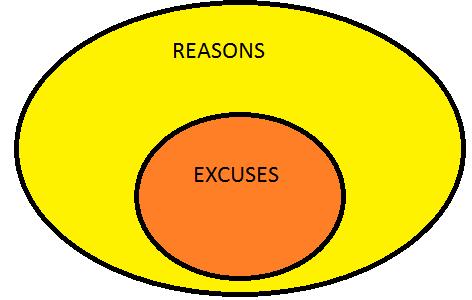I’ve been a teacher for almost 30 years. I’ve heard a few excuses over those years. Indeed, the world of education has produced the most famous excuse of all time. “The dog ate my homework”.
My favourite pupil excuse was when an A level Philosophy student of mine told me that they had been unable to complete their written assignment because they got had their toe stuck in the bath-tap the night before. Another asked for a deadline extension because their pet iguana had recently experienced a nervous breakdown. More recently, I recall an interview candidate who explained that they were late arriving because they couldn’t find their car. Not an excuse that inspired much confidence.
Traffic wardens hear more excuses than most as people offer the reasons why they should not be given a parking ticket. I know I’ve been guilty of this kind of excuse-making, amongst plentiful others, to my shame. There are many more examples in an amusing little book called called the Complete Excuses Handbook. I was going to bring it into school to read some examples out – but unfortunately my dog ate it.
It’s terribly easy to slide into the habit of excuse-making. For our own short-comings, those of our family, sports team or nation. In times when many are quick with hair-trigger judgments and blame-culture, we may even be encouraging a climate in which having an excuse up your sleeve is a wise precaution. However tempting it may be to retreat into excuse-making, it is a bad habit. As teachers – indeed as parents – we need to challenge and discourage a culture of excuses.
It’s important to distinguish between a reason and an excuse.
… A reason is a rational explanation for why something is the way it is; or a justification for why a specific action or decision was taken. It involves providing evidence and facts to back up the justification.
… An excuse is something we use to deflect blame – by shifting the focus away from the action or decision and onto external factors such as circumstances, other people, or events.
Essentially, reasons become excuses when they are used to avoid responsibility.
When we shift the blame, we duck responsibility for a failure, and we also avoid the responsibility for learning from that failure. Excuses undermine trust and honesty between people. When we make excuses, we tend to convince ourselves that we could not have changed the outcome, and therefore have no need to adapt for the future. Failure becomes easier to accept in ourselves, and we never grow beyond our current state.
George Washington, the first US president said: “It is better to offer no excuse than a bad one”. Indeed, it is far better to tell the truth and face the consequences, than it is to damage trust or deceive oneself and others.
The ease with which we make excuses is a window into our character.
We have said that the most common reason for excuse-making – or the most common excuse for excuse-making – is the desire to dodge responsibility, to avoid blame and otherwise save face. In this sense, it is an act of deception.
The other kind of excuse is when we deceive ourselves. Rather than facing up to the reality of a challenge or when we have fallen short, we rationalise the problem away. We invent a more comfortable illusion to avoid facing the truth. We may do this when we find tasks difficult and want to give up; or when we know what we are doing is not right.
Reverend Martin Luther King, Jr. wisely said: “It seems to be a fact of life that human beings cannot continue to do wrong without eventually reaching out for some rationalization to clothe their act”. Each of us will be able to think of excuses we have used to cover our tracks or explain away our habitual failings.
But my favourite line on the subject of excuses comes from Florence Nightingale.
An epitome of honest good work and courage; a person whose heroic devotion to duty in looking after the injured in the Crimean war has made her name synonymous with the caring profession of nursing.
In a letter to a friend, Florence Nightingale wrote very simply:
“I attribute my success to this – I never gave or took any excuse.”
Florence Nightingale
High performers – people who lead good and constructive lives – tend not to make excuses for themselves – or for others. They have high standards. And when they fall short, they look for reasons for the shortfall – and then search out ways put things right or mitigate them.
At the end of the day, the week, the year, how great would it feel to be able to reflect back with honesty and integrity and say what Florence Nightingale said with such clarity?
How would it feel to say: “I attribute my success to this: I did not invent excuses or blame others… I sought and accepted personal responsibility. I did my best – and when it was not good enough – I looked honestly at the reasons. I asked for help and I worked hard to improve.”
So, Dear Excuse – beguilingly tempting though you are – I must continue to do my best to shut the door on you.
Because, all the wise folk say that reward and fulfilment come most completely to those who train themselves not to make excuses.


